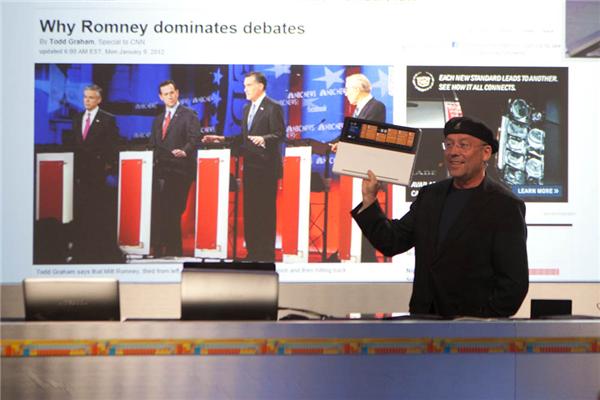Intel pulls new ultrabook features out of hat

Intel has given an update on its ultrabook efforts, demonstrating new designs and interface features aimed at making the thin-and-light devices more appealing to buyers.

Intel's Mooly Eden shows off the Nikiski concept at CES as he outlined the company's vision for ultrabooks in 2012. Image credit: James Martin/CNET News
Some ultrabooks will have touchscreens as well as keyboards, Mooly Eden, general manager of Intel's PC client group, said at a CES press event on Monday. In addition, there are plans to create hybrid 'slider' ultrabooks that can transition between a laptop and a tablet, like the Asus Eee Pad Transformer, he said.
Eden demonstrated a prototype called Nikiski, which has a transparent touchscreen below its keyboard. When the laptop is shut, users can see email, calendar and other notifications displayed on Windows 8 tiles on the screen, and interact with them via touch gestures.
"It's an ultrabook that you can type everything in a normal way, but over here we have a touchpad," Eden said. "The touchpad is transparent, and you can see the data you need."
Over 75 ultrabook designs are in the works for 2012, Eden said. The prototypes will be in a range of shapes and display sizes, including 14- and 15-inch screens.
Many of them are set to be powered by Ivy Bridge chips, which will be marketed as the "third-generation Intel Core processor family", according to Intel (PDF). Systems are expected to start arriving in the spring, with more trickling in throughout the year.
Intel stressed the multiple ways people will be able to interact with ultrabooks, and Eden showed off touch, gesture, motion and voice-based methods of controlling the systems. The features fit in with Intel's pledge at IDF in September to turn its usual design process on its head to focus on "what the user wants" in its design process.
Voice interaction is dealt with technology from Nuance Communications, maker of Dragon NaturallySpeaking voice recognition software, brought in under a partnership between Nuance and Intel that Eden announced at CES. The ultrabook software bears a similarity to Apple's Siri, except the data is kept on the device rather than in the cloud.
The Nuance technology can be used by people to vocally launch applications, play media, control emails and calendar, Intel said, adding that it plans to make a software development kit for Nuance software available to developers via the Intel AppUp Centre. The Nuance technology should be available "this year", Intel said, without giving further details.
Intel is making a huge push on ultrabooks and is determined for the category to be a success. "We have rallied the troops and our marketing engines to drive [ultrabooks] this year," Kevin Sellers, Intel's vice president of investor relations, said at the press event.
Get the latest technology news and analysis, blogs and reviews delivered directly to your inbox with ZDNet UK's newsletters.